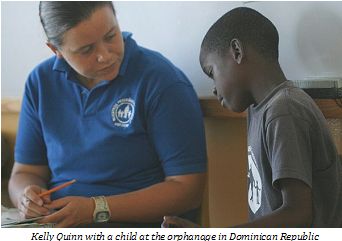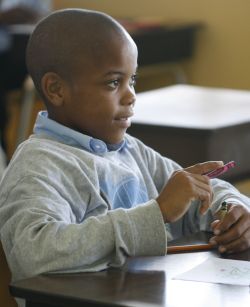By Kelly Quinn, SSC Alumna, Spanish & Social Work Major
Graduate School, sure! Job, naturally! But teaching English in another country? Never—well, that’s what I thought anyway.
I never anticipated being where I am right now—literally or figuratively. I type this, sitting a stone’s throw away from sugar cane fields, a professional MLB training camp, and two bateys. I live within the concrete walls that define our orphanage but the home and school where I work are made true and alive by my neighbors here—nearly two hundred orphaned and abandoned children.
 I graduated from Salem State College in May of 2008 having double majored in Social Work and Spanish with a Professional Concentration. I wanted to continue and earn my Masters in Social Work but I didn’t feel ready. I needed at least a year of experience and a chance to finally unite my two majors in practice—in the real world. I thought about working locally but then after having studied abroad and tired of hearing, “I wish I had done that”, I decided to explore opportunities to leave the country and volunteer in a setting where I could use my recently acquired skills while also refining them.
I graduated from Salem State College in May of 2008 having double majored in Social Work and Spanish with a Professional Concentration. I wanted to continue and earn my Masters in Social Work but I didn’t feel ready. I needed at least a year of experience and a chance to finally unite my two majors in practice—in the real world. I thought about working locally but then after having studied abroad and tired of hearing, “I wish I had done that”, I decided to explore opportunities to leave the country and volunteer in a setting where I could use my recently acquired skills while also refining them.
It was Dra. Serra that first told me about Nuestros Pequeños Hermanos (NPH), an international organization committed to providing a home, education, and family to orphaned and abandoned children in Latin America. Having started in 1954 with a priest from the United States by the name of Father Wasson, NPH has grown to nine countries: Mexico, Honduras, Haiti, Nicaragua, Guatemala, El Salvador, Dominican Republic, Peru, and Bolivia. The first home began in Mexico when Wasson, in disagreement with a court’s attempts to punish a child from stealing from him, instead chose to adopt him. For more information about NPH, you can visit their website: www.nph.org.
 In December of my senior year I was offered a position at the NPH home in the Dominican Republic as an ESL instructor and assistant in the Social Work office. I never had thought I would go to another country to teach English. In fact I had said I never would, but the promise to be able to do social work balanced this out. However, later in December, Carol Deanow, a professor in the Social Work Department, told me about the Samuel Huntington Public Service Award. Every year National Grid provides $10,000 grants to graduating undergraduate students to complete a project locally or abroad. I never really thought that I had a chance, especially when the list of students who had won previously all came from private colleges. Still, I applied.
In December of my senior year I was offered a position at the NPH home in the Dominican Republic as an ESL instructor and assistant in the Social Work office. I never had thought I would go to another country to teach English. In fact I had said I never would, but the promise to be able to do social work balanced this out. However, later in December, Carol Deanow, a professor in the Social Work Department, told me about the Samuel Huntington Public Service Award. Every year National Grid provides $10,000 grants to graduating undergraduate students to complete a project locally or abroad. I never really thought that I had a chance, especially when the list of students who had won previously all came from private colleges. Still, I applied.
I contacted NPH to find out what would be the best project to propose for and they said an ESL lab. I was almost disappointed at first because, well, like I said, I never really wanted to go to another country to teach English. It seemed like an invasion of sorts. Yet, I began to research the importance of English, especially in the Dominican Republic and I was astounded. For example, our orphanage is by San Pedro de Macorís and while it was once one of the best cities in the Dominican Republic, since the sugar cane industry turned, it has never recovered—reflected in unemployment as high as 80% according to some.
No one was more surprised than I was when I found out in April of my senior year that out of approximately 80 applicants nationally, I was one of three that had won the award. What followed and continues even as I type this nearing 1:00am has been almost a year of nonstop work—coordinating shipping of books, organizing classes, advocating for the importance of English, and getting to know all the students. It has been this last part that has made the true difference. I am currently the home’s only English teacher which means I teach from preschool through high school. The task is nearly impossible but I have balanced it by taking the time to know my students and having them know me. The first half of the year, I ate in a different house with the children every night. I made sure to know them and by doing that ,they knew me. What followed has been a year of learning, perhaps more discipline than English at times even, but still they have learned and have exceeded my expectations by far—something that is very rarely done, even by myself.
The orphanage now has a separate English laboratory, complete with elementary and high school level curriculums. If the orphanage is able to continue the program, our students will finish high school having completed an ESL series, Interchange, that is often used in the nearby language institutes which provide the language skills needed to find almost any work here. Considering their backgrounds, which already present unique challenges, the importance of this gift cannot be denied. By 2010, Dominicans that do not know English will essentially be considered illiterate—for English is now as important as Spanish in this country. Additionally, one out of every eight Dominicans will move to the U.S. permanently according to the book Why the Cocks Fight, which outlines the extremely complex history of Hispaniola.
My life here is different than most of my peers that recently graduated. I live in a volunteer house at the orphanage which currently has the age range from 23 to 65 and houses volunteers from many countries, from the US and Haiti to France, Austria, Germany, and Spain. I sleep on a bunk bed—the bottom bunk. I live without hot water. Electricity runs approximately 12 hours a day but it “leaves” without warning and “returns” in the same fashion. My afternoons and most weekends are spent with the children who never fail to make me laugh, even on the most tiring of days. It hasn’t been easy—especially learning the Dominican dialect of Spanish that tends to leave out “s” and use unique words like guagua for bus (autobús) and un chin for a little (un poco)—but I feel that while I have been better preparing them for the next steps in their lives, they too have prepared me.
I came here within two weeks of graduating from SSC and within approximately two weeks of returning this May to the US, I will be continuing at SSC to earn my MSW. My goal is to work as a bilingual social worker in a forensics setting and to eventually earn my Doctorate so that I can better advocate for the training and preparation of social workers to serve non and limited English speaking clients—first and foremost by learning additional languages and refining those they already know. I would encourage all students to take advantage of their education at SSC which really does expand beyond the North Shore to reach the different corners of this world. Who knows, maybe you’ll find yourself where I am, remembering the old adage, never say never. ¦
[…] Nunca Digas Nunca: Life “Between” Salem State College By Kelly Quinn, SSC Alumna, Spanish & Social Work Major […]
By: Volume 6, Issue 2, Spring 2009 - Contents « Lingua Franca on April 27, 2009
at 6:42 am
Kelly I want to thank you for sharing this life experience and how you got to where you are now. I am inspired and impressed with what you are doing in the Dominican Republic.
By: Aniluz Jimenez on April 28, 2009
at 11:49 am